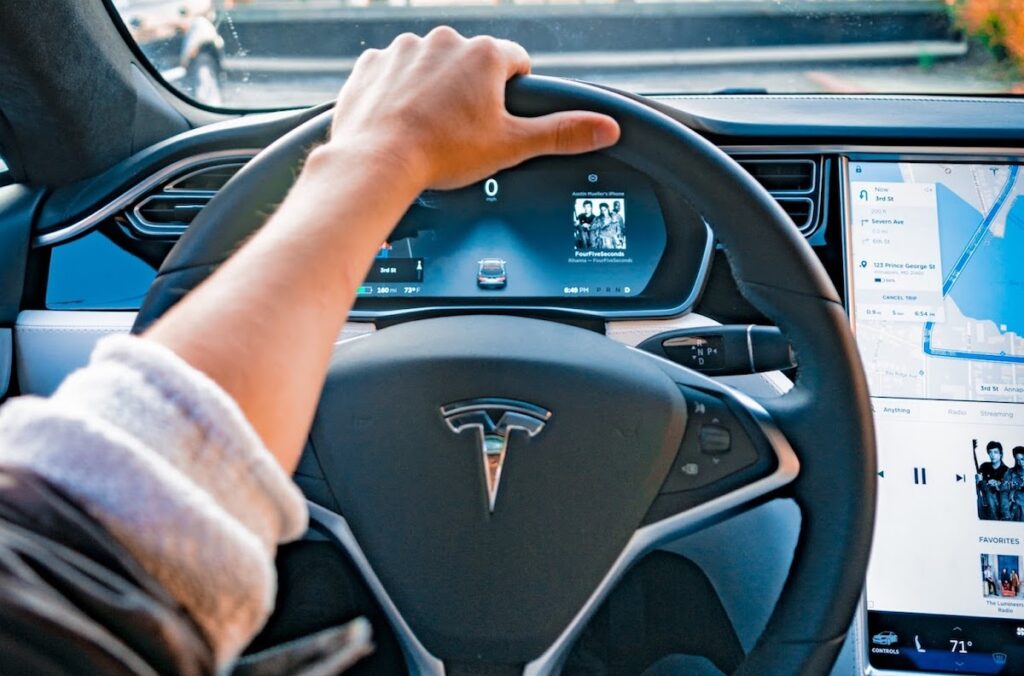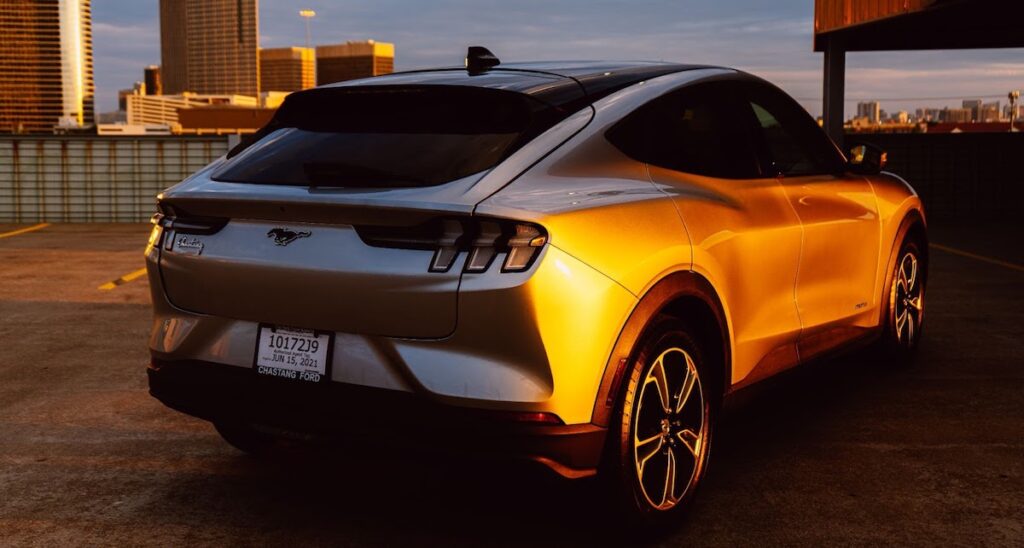
The number one reason I hear that people don’t run out and buy an electric car isn’t that they like the sound of a rumbling V-8 engine or that they are afraid of it running out of power and leaving them stranded on the 405.
The main fear people have is the potentially high cost of buying, maintaining, and repairing an electric car. Honestly, just a few years ago that fear was very real. However, the ownership of EVs is looking like a much more affordable option in the near future.
Let’s take a look at the full cost of electric cars and how they compare to gas-powered cars.
Total 2-Year Cost Comparison
Our non-scientific 2-Year Cost Comparison relies on some basic driving assumptions, which we will explain in detail later in this article.
1st Year Cost Comparison
| Gas-Powered Chevy Trailblazer (LT FWD) | Electric Chevy Bolt EUV (LT FWD) | |
|---|---|---|
| Purchase Price | $26,360* *Comparably Optioned | $28,195* *Driver Convenience Package |
| Tax Credits | N/A | -$7,500 Federal* -$2,000 Colorado |
| EV Tax | N/A | $50 |
| Insurance | $2,019 | $2,321 (15% Premium) |
| Home Charger | N/A | $450 (After Federal Tax Credit) |
| Fuel | $1,784 | $552 |
| Repairs & Maintenance | $0 (Recommended services are Included for 12 month) | $0 |
| TOTAL 1st Year Cost | $30,163 | $22,068 |
2nd Year Cost Comparison
| Gas-Powered Chevy Trailblazer (LT FWD) | Electric Chevy Bolt EUV (LT FWD) | |
|---|---|---|
| EV Tax | N/A | $50 |
| Insurance | $2,019 | $2,321 (15% Premium) |
| Fuel | $1,784 | $552 |
| Repairs & Maintenance | $700 | $350 |
| TOTAL 2nd Year Cost | $4,503 | $3,223 |
2-Year Savings Analysis
| Total Saved Without Federal Tax Credit | $1,875 |
|---|---|
| Total Saved With Federal Tax Credit | $9,375 |
Summary: As you can see, electric cars are still typically more expensive to purchase and have higher insurance and setup costs. However, the fuel and maintenance costs of electric cars are slightly lower. Currently, the main saving potential of electric car ownership comes from potential government tax credits.
Note: Many electric cars or car buyers do not qualify for this credit, or only qualify for partial credit, so be sure to stay up-to-date on the qualifications.
The Cost to Buy an Electric Car

Up until very recently, electric cars have cost quite a bit more than gas-powered cars. For many people, this has prevented them from ever considering owning one. A recent report from Kelley Blue Book shows that the average price for an electric car is $66,654. Nearly $19,000 more than the price of a new mid-size crossover at $47,747.
This discrepancy is mainly due to the fact that the large car manufacturers are only now getting into the game. Tesla has dominated the EV market for the past 10 years—and with their flagship Model S base price starting over $100,000, they had their focus on the luxury car market.
With 2022 sales of electric cars topping 650,000 units, nearly all major manufacturers, even Dodge, have decided to take a bite out of the rapidly growing electric car market. These massive automakers are about to flood the market with many new low-cost EV choices that will quickly close the $19,000 gap and make electric cars just as affordable.
We’re already starting to see this with manufacturers like GM announcing the Chevy Bolt EUV available for under $30,000.
Cost to Insure Electric Cars

Another consideration you should make before dropping your hard-earned cash on an electric car is the higher cost of car insurance. According to Bankrate.com car insurance rates on electric cars are on average 15% higher than on gas-powered cars.
The higher cost is mainly due to the fact that electric cars cost more than gas-powered cars and therefore are more expensive to replace in the event of a total loss. The other reason is that because there are fewer EVs than traditional gas cars their replacement parts are harder to find and more expensive.
Of course, different models are more expensive to insure than others. Automobiles that share parts with their internal combustion sibling, like the MINI Electric, tend to be more affordable than fully unique body style EVs.
Additionally, each insurance carrier has a different appetite for insuring EVs. So, do your due diligence and check with multiple carriers to find the most competitive rate.
Additional Taxes and Fees for EVs

Many states have recently implemented new taxes or fees on electric car owners. Why? Historically, the taxes to maintain the roads and bridges came directly from taxes placed on gas. Of course, EVs use the same roads and bridges as gas-powered cars so 30 states have already added additional fees to the registration of electric cars.
These taxes and fees are calculated differently from state to state and range from $50 to as high as $300. It is logical to assume that many states will raise these fees as more electric cars hit the road and the tax on gas is no longer sufficient to support transportation infrastructure.
Cost to Drive an Electric Car

The main benefit of electric cars is that they cost less to drive than their gas-powered counterparts. Electric cars need less energy to go the same distance as gas-powered cars resulting in a lower cost to operate.
The average cost of electricity in America is around $0.14 per kWh (Kilowatt Hour). It takes 40-60 kWh to fully charge an electric car. Most electric cars can drive an estimated 250 miles on a full charge. Therefore, you can fully charge your EV for less than a double quarter pounder with cheese and a Diet Coke!
Real Life EV vs. Gas Purchase Comparison
Here’s a breakdown of the cost of driving 100 miles in an electric Chevy Bolt EUV vs the gas-powered Chevy Trailblazer:
| Comparison | Price | Fuel Storage | Fuel Cost | Range | Cost/100 Miles |
|---|---|---|---|---|---|
| Chevy Bolt EUV (LT FWD) | $28,195* *Driver Convenience Package | 65 kWh | $.14 kWh | 247 Miles | $3.68 |
| Chevy Trailblazer (LT FWD) | $26,360* *Comparably Optioned | 13.2 Gallons | $3.69 Gallon | 409 Miles | $11.90 |
If you were to drive 15,000 miles a year, you can expect to save about $1,200 annually on fuel driving the electric Chevy Bolt EUV versus the, slightly lower priced, gas-powered Chevy Trailblazer.
Therefore it may take the average driver about 18 months to recoup the difference in the purchase price. Then you’re “in the black,” as they say, and that is before you consider the potential federal and state tax incentives.
The “Potential” Benefit of EV Tax Credits

One of the major benefits of purchasing a new electric car over a used or gas car is the current tax incentives. The US government and many states are promoting the adoption of electric vehicles, and to incentivize buyers to choose electric over gas they are offering substantial rebates, incentives, and tax credits.
Currently, the federal government is offering a $2,500-$7,500* tax credit on all new electric vehicles. The credit amount varies based on the capacity of the battery used to power the vehicle and your personal taxes owed. Any unused portion of the credit will not be refunded or credited to future years’ taxes.
*New requirements contained in the Inflation Reduction Act may prevent some automobiles from qualifying for the tax credit, starting in January 2023. To receive the full credit, the new Act requires 40% of the minerals in the batteries to come from North America, and “half of the batteries value” must be manufactured or assembled in the US. Currently, there are no batteries that meet this standard. There are efforts in place to amend or delay this requirement until US manufacturing can get up to speed.
So, depending on if the manufacturers or the government get the batteries sourced or the Inflation Reduction Act amended, your electric car purchase may or may not receive the $7,500 federal tax credit.
Many states and power associations also offer additional incentives, rebates, or credits for purchasing a new electric car and even home charging stations. These rebates can range from a few hundred dollars to thousands of dollars. In Colorado, where I live, the state is currently offering a credit of $2,000 on any electric vehicle purchased and even some home chargers.
The Cost of a Home Charger

Most electric cars come with a standard 120-volt Level 1 Charger. (“Most” because Tesla no longer includes a charger with the purchase). A Level 1 Charger plugs directly into a standard power outlet in your home. Charging this way can take up to 43 hours to charge a Chevy Bolt EUV from empty to full.
Knowing this, you, like many other EV owners, may choose to install a 240-volt Level 2 Charger in your home that can charge your electric car in just over 5 hours.
The rub is the cost. The main expense of a Level 2 home charger isn’t actually the $400-$1000 sticker price of the charger, it’s the total cost of the installation and possible upgrades to your home’s electrical system. For some owners, it may double or triple the cost of the charger.
Selecting the right charger for your situation may greatly reduce the cost of the installation so be sure to visit our guide on How Do You Charge Electric Cars at Home? [The Best Home Setup].
For simplicity’s sake, let’s assume you were to buy the reasonably priced charger with basic features for $640 and your home’s electrical system easily meets the requirements for the charger so you only needed to add the 240-Outlet and wiring. The total cost for this including parts was $400. So your total cost for the charger and installation was $1,040.
Federal Tax Credits for Chargers
The Federal government is currently offering the Alternative Fuel Vehicle (AFV) Refueling Property Credit, which credits you 30% of the cost of qualifying home chargers plus up to $1000 for the installation*.
*The AFV Refueling Property Credit was recently extended to 2032 under the Inflation Reduction Act.
Therefore, using the example above, the all-in cost of the Level 2 Charger plus installation after the tax credit would be just under $450. That sounds pretty reasonable if you ask me, but you have to consider how much your electric bill may go up.
The Additional (Monthly) Cost of Your Utility Bill

One of the most common concerns for people who hate high energy bills is that owning an electric car will double or triple your monthly electric bill. Well, before you turn off all our lights and turn down the heat, let’s look at the actual additional cost of electricity.
The average cost of electricity in the US is $0.14 a kWh. The average home uses nearly 900 kWh of electricity per month. This would make the average US electric bill around $125 a month.
If you were to own and drive an electric car, like the Chevy Bolt EUV as your primary car, and you NEVER charged it anywhere other than your home. Realistically, you would occasionally use a charger at the mall or at your work…. Nonetheless, let’s assume you NEVER charged anywhere but your home.
If you were to drive 15,000 miles a year, your monthly electric bill would rise by… $46! Remember, you’re not paying one cent in gasoline anymore, so you’re saving a significant amount on fuel overall.
[Related Article: How Much Does It Cost To Charge an Electric Car?]
The Cost to Repair

Many believe that electric cars are more difficult and expensive to maintain than gas-powered cars. In fact, the opposite is true. EVs actually require fewer repairs than gas-powered cars.
The regenerative braking system turns on when the accelerator isn’t pressed. The momentum from the tires is transferred to the motor and used to recharge the batteries. This process naturally slows the car and reduces the need for braking, thus saving the wear and tear on brakes.
Electric motors are sealed and have only one moving part, therefore there is no need for expensive motor oil and transmission fluid changes like in gas-powered cars. For example, the 2022 Hyundai Kona EV recommends only 14 items to be serviced in the first 16,000 miles while its gas counterpart recommends over 40 items to be serviced in the same timeframe.
Cost of Replacement Batteries

Having to replace the battery is, and should be, a huge concern for electric car buyers. This is because the cost to replace a battery can easily exceed the entire value of a high-mileage used EV.
Additionally, the explosion of new electric cars has spun off new industries, like EV battery repair and replacement. There are companies now that can upgrade your older Tesla batteries to increase their range by 200% and increase their output to make the car even faster.
While the fear of replacing a faulty battery shouldn’t be taken lightly, the concern is a little overblown. With the lifespan of batteries expected to be 15-20 years, the battery will likely outlast the rest of the car. To curb their consumers’ fears about battery failure, Chevrolet is offering an 8-year, 100,000-mile warranty on the batteries in the 2023 Chevy Bolt EUV.
Final Thoughts
If you were to ask me how the cost of electric cars compares to gas cars, I’d say that the EV revolution is still in its infancy and many of the benefits of purchasing an EV are heavily subsidized by the state and federal governments.
Electric cars may not offer you massive savings, but considering the lowering price point of electric vehicles, potential tax credits, and gas savings, I feel it is now a fair assumption that you can save some money by owning an electric car.


Hello there, just became aware of your blog through Google, and
found that it is really informative. I am gonna watch out
for brussels. I’ll appreciate if you continue this in future.
Lots of people will be benefited from your writing.
Cheers!